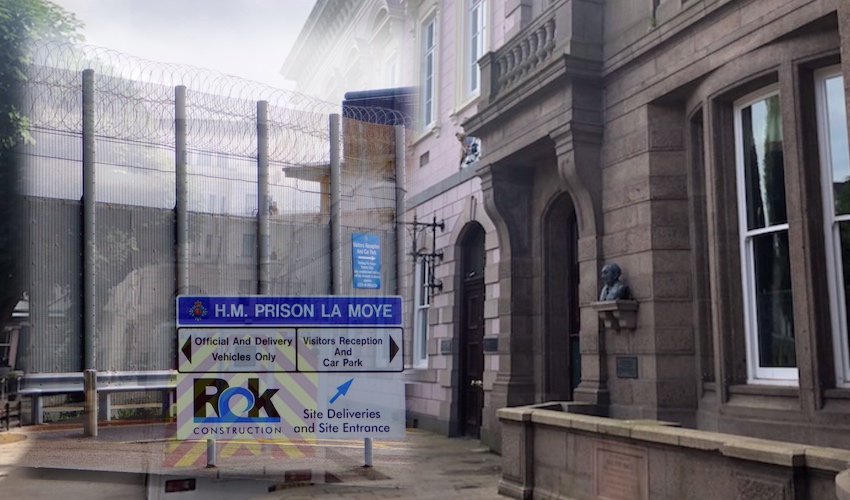


A 57-year-old accused of stabbing a pubgoer last year has said he was “dazed and confused” at the time and only intended to “frighten” the man – but that he walked into his knife as he was leaving the bar.
Paul Anthony Hadikin denies one count of attempted murder and one alternative count of grave and criminal assault against a 33-year-old at Temple Bar in December last year.
On the third day of his Royal Court trial, Mr Hadikin admitted brandishing a kitchen knife but said he "had no intention of harming anyone at all".
However, Crown Advocate Matthew Maletriot, prosecuting, argues that Mr Hadikin carried out a "deliberate and targeted act of revenge" after a clash with the man earlier in the evening.
After being headbutted by the man, Mr Hadikin left the pub, but then allegedly re-entered 13 minutes later, stabbing the man once in the abdomen and causing a "life-threatening wound", and leaving again within seconds.
On Tuesday, the jury heard how Mr Hadikin then handed himself to police before travelling to the station and telling an officer and doctor about feeling the blade go "all the way through".
Pictured: Mr Hadikin's Royal Court trial opened on Monday.
Yesterday, the jury first heard evidence from Detective Constable Lang, the officer in charge of the investigation.
He said that Mr Hadikin told officers during an interview on 4 December that the knife involved was on the "left-hand side" of the pitch at Springfield Stadium. However, despite several extensive searches with specialist equipment, the knife was never found.
The jury also heard a recording of a call Mr Hadikin made from his prison cell at La Moye to his ex-partner's number in January.
In it, Mr Hadikin's expressed his confusion that police never found the knife, which he described as "massive", "about two foot long... for cutting steaks and things".
He said he had bought the knife to use for his Christmas dinner, and it was "more like a sword than a knife".

Pictured: The Royal Court jury were played a recording of a telephone call Mr Hadikin made from prison in which he described the knife as "massive".
The defendant himself then took to the stand, firstly telling the jury how he had drunk a bottle of wine by himself in his flat on an empty stomach before heading to Temple Bar.
While the first part of his account of heading to Temple Bar with acquaintances was consistent with other witnesses' statements and matched the CCTV footage shown, he disputed that there had been a heated discussion with his alleged victim because he "didn't' know him".
He said that his first recollection of entering the pool room was "being hit in the face without warning". He said: "I was headbutted. I saw a large white flash and fell backwards".
He then described hitting the back of his head on the bar and feeling "dazed". When asked if he was angry about being headbutted, Mr Hadikin replied: "I was just confused."
He that he couldn't remember leaving the Temple Bar, but confirmed that a person shown leaving on CCTV footage was him, though he said this didn't jog any memories.
Returning to his flat, he described contemplating harming himself with a knife as he was apparently "in fear and confused."
He said he didn't know why he left his flat but confirmed he took a knife with him, though he couldn't recall what type.
"I was contemplating threatening the assailant, not intending to harm or injure anyone but just threatening people... I had no intention of harming anyone at all whatsoever," Mr Hadikin claimed.
He added: "I can't recall what was in my mind, but I vaguely recall that I was going to frighten the assailant, not assault him."
Mr Hadikin then described entering the doorway of the bar as the victim was leaving and explained that the two of them "clashed in the doorway" while he "had the knife low down in my hand".
"It happened so quick... I remember the knife entering his body, but I didn't make any stabbing motions. I was just holding it in my hand, I didn't raise it," he said.
He told the jury that once he felt the knife enter the man's body, he "turned around and ran away in fear" but remained "very confused".
Explaining why he later handed himself in to the police, Mr Hadikin said: "Police sirens were everywhere, all round my building. I knew I'd done something wrong, so I just handed myself in."

Pictured: Mr Hadikin handed himself in to police.
He added: "I didn't know exactly what I'd done but I knew it was me that they were looking for".
In cross-examination, Crown Advocate Maletroit suggested that he got the knife to defend himself, as he was older and less physically fit than the man who had allegedly headbutted him.
Mr Hadikin maintained that he "never planned on hurting anybody".
When asked why he sent text messages to his daughter saying that he had stabbed and killed someone, Mr Hadikin replied: "I was confused, I don't recall sending those messages."
He added: "I'm very sorry for what happened, it's terrible. I can't stop thinking about it every single day when I wake up. I can't piece together how it happened."
Advocate David Steenson, defending, then called consultant neuropsychiatrist at St George's Hospital in London, Dr Norman Poole, to the stand.
Dr Poole recalled being "struck by the description of white light and the altered perception of time and the world following a head injury" after assessing Mr Hadikin in April this year.
He said Mr Hadikin's description was consistent with symptoms of "derealisation and depersonalisation", which is a "dissociative episode where you're split off or cut off from parts of your mental function and the world around you."
It can be part of a personality disorder stemmed from depression, but has also been reported to be triggered by a head injury.
Dr Poole explained that people experiencing derealisation or depersonalisation feel "disconnected from things" as if they "can't control their actions and movements to the same degree as before" and often suffer memory loss.
He said that "the bright white light and memory problems are common" specifically when "derealisation follows a head injury".
The neuropsychiatrist explained to the jury that although people experiencing this feel "out of control", it "doesn't make you do things you don't want to do or alter your ability to form voluntary acts".
During Advocate Maletriot's cross-examination, Dr Poole acknowledged that it was possible that Mr Hadikin could have given him a false account of how much he remembered.
Dr Poole also agreed that it was possible that the defendant's intoxication, lack of food and highly emotional state also could have caused the memory loss described.
The jury also heard that Mr Hadikin had been previously involved with the police in a violent episode in which he only remembers coming round in the police station afterwards.
The jury have now heard all the evidence and both prosecution and defence will give their final summaries this morning.
Comments
Comments on this story express the views of the commentator only, not Bailiwick Publishing. We are unable to guarantee the accuracy of any of those comments.